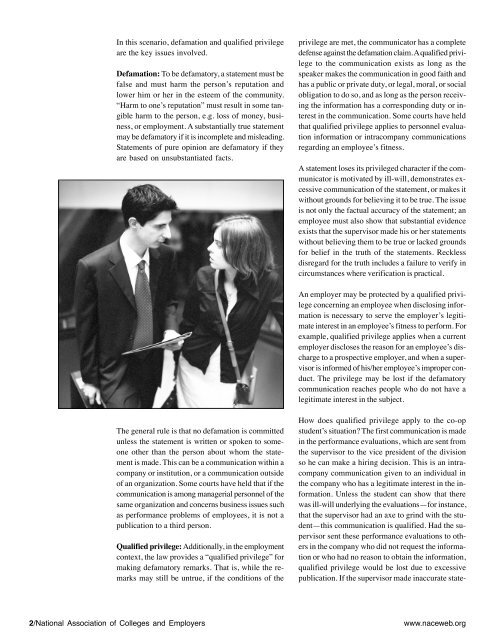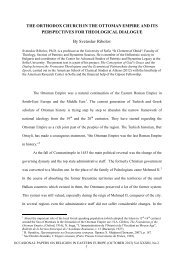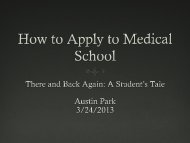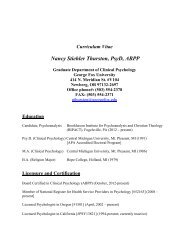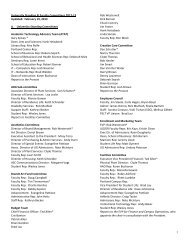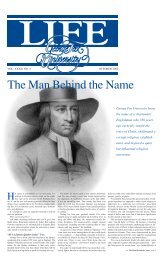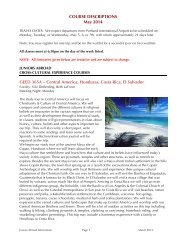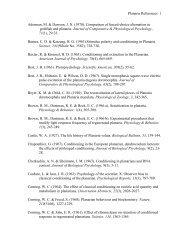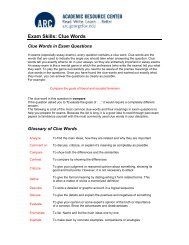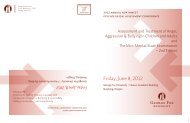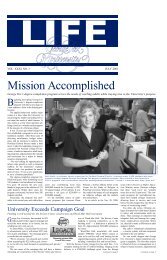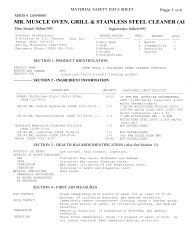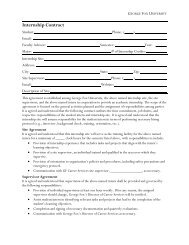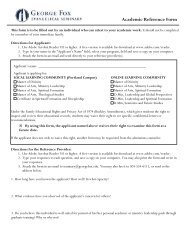References - National Association of Colleges and Employers
References - National Association of Colleges and Employers
References - National Association of Colleges and Employers
Create successful ePaper yourself
Turn your PDF publications into a flip-book with our unique Google optimized e-Paper software.
In this scenario, defamation <strong>and</strong> qualified privilege<br />
are the key issues involved.<br />
Defamation: To be defamatory, a statement must be<br />
false <strong>and</strong> must harm the person’s reputation <strong>and</strong><br />
lower him or her in the esteem <strong>of</strong> the community.<br />
“Harm to one’s reputation” must result in some tangible<br />
harm to the person, e.g. loss <strong>of</strong> money, business,<br />
or employment. A substantially true statement<br />
may be defamatory if it is incomplete <strong>and</strong> misleading.<br />
Statements <strong>of</strong> pure opinion are defamatory if they<br />
are based on unsubstantiated facts.<br />
privilege are met, the communicator has a complete<br />
defense against the defamation claim. A qualified privilege<br />
to the communication exists as long as the<br />
speaker makes the communication in good faith <strong>and</strong><br />
has a public or private duty, or legal, moral, or social<br />
obligation to do so, <strong>and</strong> as long as the person receiving<br />
the information has a corresponding duty or interest<br />
in the communication. Some courts have held<br />
that qualified privilege applies to personnel evaluation<br />
information or intracompany communications<br />
regarding an employee’s fitness.<br />
A statement loses its privileged character if the communicator<br />
is motivated by ill-will, demonstrates excessive<br />
communication <strong>of</strong> the statement, or makes it<br />
without grounds for believing it to be true. The issue<br />
is not only the factual accuracy <strong>of</strong> the statement; an<br />
employee must also show that substantial evidence<br />
exists that the supervisor made his or her statements<br />
without believing them to be true or lacked grounds<br />
for belief in the truth <strong>of</strong> the statements. Reckless<br />
disregard for the truth includes a failure to verify in<br />
circumstances where verification is practical.<br />
An employer may be protected by a qualified privilege<br />
concerning an employee when disclosing information<br />
is necessary to serve the employer’s legitimate<br />
interest in an employee’s fitness to perform. For<br />
example, qualified privilege applies when a current<br />
employer discloses the reason for an employee’s discharge<br />
to a prospective employer, <strong>and</strong> when a supervisor<br />
is informed <strong>of</strong> his/her employee’s improper conduct.<br />
The privilege may be lost if the defamatory<br />
communication reaches people who do not have a<br />
legitimate interest in the subject.<br />
The general rule is that no defamation is committed<br />
unless the statement is written or spoken to someone<br />
other than the person about whom the statement<br />
is made. This can be a communication within a<br />
company or institution, or a communication outside<br />
<strong>of</strong> an organization. Some courts have held that if the<br />
communication is among managerial personnel <strong>of</strong> the<br />
same organization <strong>and</strong> concerns business issues such<br />
as performance problems <strong>of</strong> employees, it is not a<br />
publication to a third person.<br />
Qualified privilege: Additionally, in the employment<br />
context, the law provides a “qualified privilege” for<br />
making defamatory remarks. That is, while the remarks<br />
may still be untrue, if the conditions <strong>of</strong> the<br />
How does qualified privilege apply to the co-op<br />
student’s situation? The first communication is made<br />
in the performance evaluations, which are sent from<br />
the supervisor to the vice president <strong>of</strong> the division<br />
so he can make a hiring decision. This is an intracompany<br />
communication given to an individual in<br />
the company who has a legitimate interest in the information.<br />
Unless the student can show that there<br />
was ill-will underlying the evaluations—for instance,<br />
that the supervisor had an axe to grind with the student—this<br />
communication is qualified. Had the supervisor<br />
sent these performance evaluations to others<br />
in the company who did not request the information<br />
or who had no reason to obtain the information,<br />
qualified privilege would be lost due to excessive<br />
publication. If the supervisor made inaccurate state-<br />
2/<strong>National</strong> <strong>Association</strong> <strong>of</strong> <strong>Colleges</strong> <strong>and</strong> <strong>Employers</strong><br />
www.naceweb.org


